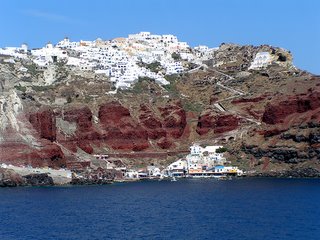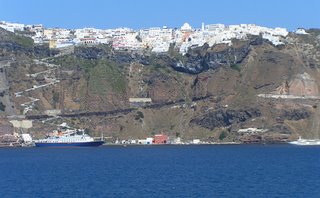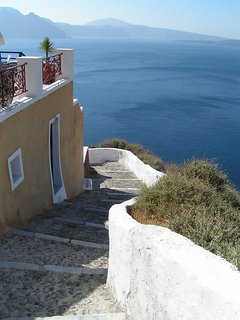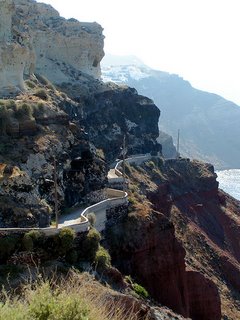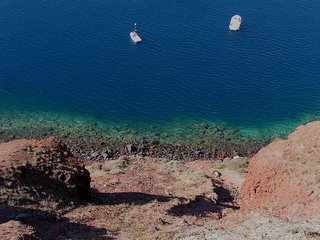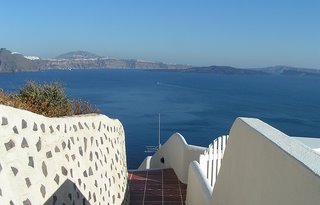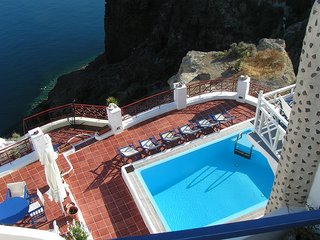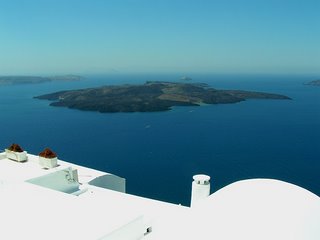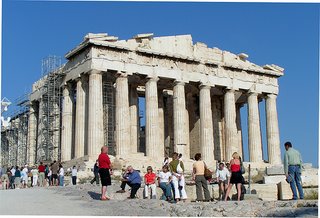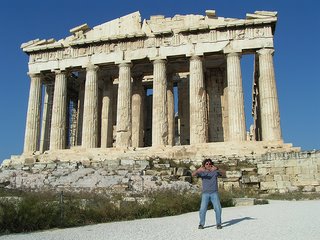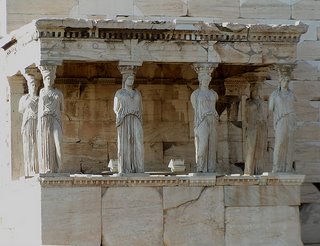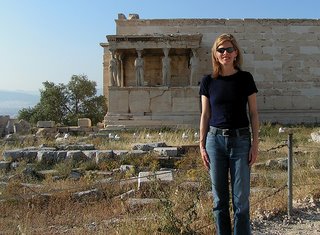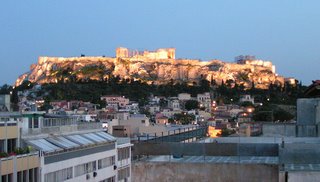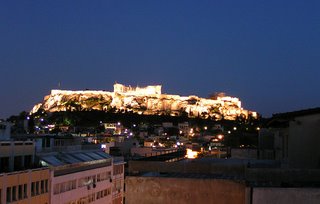We're back in Austin after a 25-hour day of airplane travel, including the waiting time. What a bright and shining country this is when you come back to it after being away! Landing via Olympic Airways with fellow passengers who were mostly old Greeks (actually the plane was less than half full), I imagined how the immense spaces, the wide roads, the ever-growing prosperous communities where average people live in neat, clean, spacious houses, must look to a newcomer from a cramped, poor, shabby country, the way it looked to my grandparents. No matter how much fun I've had on a foreign vacation, whenever I come back I feel like kissing the ground.
I want to thank all of you readers and commenters who kept up with my reports for the past couple of weeks. I wrote them on the fly, and time didn't allow me to answer the comments individually, but it's great to see comments by familiar people and new ones alike. Thanks too for letting me know that one of the posts was a "Best of Austin."
And a special reply to Ali Eteraz: Best of luck to you! Be my guest!
Just to wrap up a couple of experiences I didn't get a chance to report about before I left:
On the beach at Agios Pavlos we set up an impromptu nudist colony along with a few other couples. I mentioned earlier that at that southerrn Cretan village there's a series of sandy coves separated by walkable rocks. You go from cove to cove, meeting progressively fewer people as you go on: in some coves you find no one at all. At about the third cove, we found a gray-haired man in very good shape running nude along the beach. At about that time we also found a young nude woman sunbathing, who sat up hunched when we came on the scene, raising her knees and wrapping her arms around them in the classic "hide the peach" posture. Well, we found a patch of sand of our own and stripped and ran into the small Mediterranean surf and swam naked, and later I did tai chi naked on the wet sand. (Photos of that event will NOT be part of my forthcoming online offering.) Each couple or singleton was spaced far enough from the others not to feel intruded upon, and we scarcely said a word to each other, and looked at each other only briefly and semi-covertly, but I think a sense of community was formed: we were all supporting each other in the same release from inhibition. None of us was a perfect specimen, and most of us were middle-aged; we were exactly what we were, and that was all we needed to be. We could look and think, "Oh, there's a person who's thus-and-so, and she's going around naked! I can too!"
The next day we were in a completely different environment: back to Herakleion, the capital of Crrete, to prepare for departure. A few kilometers away from Knossos where the Minotaur killed his victims, the streets of Herakleion are a labyrinth that would have stupefied Theseus. I have never seen a more confusing city; it makes, for instance, Casablanca look like an orderly, well-laid out product of intelligent design. The combination of signless streets, uninformative maps, hectic traffic, and road construction made finding our destinations almost impossible. The big street we hoped to go on was closed for repair, and the alternate routes were arranged in one-way patterns that forced us to go around and around in repeated circles, with our hotel seeming unreachable in the center. Finally, I don't know how, we pierced through, and in a lucky moment I happened to see that one of the interchangeable white buildings we were passing had a sign with our hotel's name on it. If I hadn't seen it in time, it would have taken us forever to get back.
We ate at a wonderful unpretentious restaurant near our hotel, the Heliopotis (my transliteration). The word means "sun drinker" and it was coined by the Nobel-winning poet Odysseus Elytis to imply a thirst for life, light, and learning. The artistic, humane spirit of the owner, who chose such a name for his small haven from ugliness, came through in a mustard sauce for roast pork, and in cabbage leaves stuffed with mincemeat and rice in an egg and lemon sauce. If you're ever in Herakleion, seek it out. It's not in the guidebooks but it should be.
As we ate, we noticed a young man walking back and forth in the street. He walked in one direction, got to the end of the block, turned, walked to the other end, turned, walked back, and so on. He did it all through our dinner. Often he kept one arm pinned to his abdomen. We asked the restaurateur, and he told us that the young man was a Turkish Kurd who had once been arrested by the police in Herakleion and had been severely beaten, causing brain damage. Now he walked back and forth, and the people on the block took care of him. Human rights in the EU!
After this European travel, we've been thinking we'd like to see more of North America from now on. We want to go to Zion National Park -- and swim with manatees in Florida -- and raft in Idaho -- and see the tides in the Bay of Fundy -- and the Mayan ruins in the Yucatan. There's so much to see on this side of the world, and it's so disappointing to go to someplace like the Parthenon or Knossos and find it's all covered in metal scaffolding, or it's just a rubble of stone propped up by some bygone archeologist's reconstructive guesswork. To tell you the truth, there's more going on in Austin than in all of Greece: better food, nicer people, and above all, a sense of the present. Some women swim topless in Barton Springs Pool, for that matter. Not that that means anything to me, of course.
